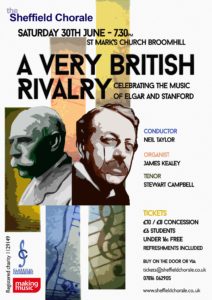A Very British Rivalry – Celebrating the Music of Elgar and Stanford
On Saturday 30th June, the Sheffield Chorale will be performing a selection of works by Stanford and Elgar. The concert will be given at 7:30pm at St Mark’s Church Broomhill. Tickets are £10, £8 concessions, £6 students and free to the U16s. Tickets can be bought on the door or via tickets@sheffieldchorale.co.uk. Refreshments are included.
In the early part of the twentieth century, Elgar was at the height of his fame and was beginning to eclipse Stanford at the forefront of English music. In 1904, Elgar was appointed as Peyton Professor at Birmingham University and following this, Stanford wrote a letter to Elgar know as the ‘odious’ letter (perhaps containing an ill-judged comment) which offended the Elgars.
In retaliation, in his inaugural lecture titled ‘A Future for Englands Music’, Elgar denounced composers of Rhapsodies (Stanford having written the 6 Irish Rhapsodies) and in his later lectures asserted that English music was in no way respected abroad (Stanford having enjoyed success abroad with a number of works).
Communication between Stanford and Elgar, on the whole, ceased after this and throughout the coming years events such as a dual publication at the same time of the St Matthew Passion (Stanford with Stainer & Bell and Elgar with Novello) did nothing to help. Stanford believed Elgar had orchestrated the release of his edition to damage his own.
The estrangement didn’t stop Stanford and Elgar conducting each other’s music, with Stanford standing in at the last minute to conduct Gerontius when Elgar fell ill and with Elgar conducting Stanford’s Symphony No.7 at Cambridge after it’s premiere in 1912.
The programme for the concert can be seen below:
I was glad (1902) – C Hubert H Parry
The Spirit of the Lord (1902) – Edward Elgar
O Salutaris Hostia (1880) – Edward Elgar
Magnificat (1918) – C Villiers Stanford
Te Deum (1897) – Edward Elgar
Benedictus (1897) – Edward Elgar
Give unto the Lord (1914) – Edward Elgar
Six Bible Songs and Hymns (1910) – C Villiers Stanford
Song of Freedom Tenor
Let us with a gladsome mind Chorus
Song of Trust ~ Tenor
Purest and highest Chorus
Song of Hope ~ Tenor
In Thee is gladness Chorus
Song of Peace Tenor
Pray that Jerusalem Chorus
Song of Battle ~ Tenor
Praise to the Lord Chorus
Song of Wisdom Tenor
O for a closer walk with God Chorus
Great is the Lord (1912) – Edward Elgar

